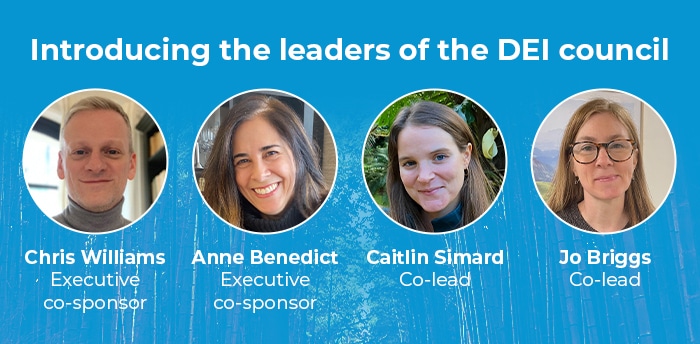We’re excited to announce the launch of our Diversity, Equity and Inclusion (DEI) council, dedicated to increasing equality and promoting diversity in our company. We believe that by empowering underrepresented groups, we’ll not only create a better workplace, but also drive innovation and growth. Here we speak to Council Co-Lead, Jo Briggs about its purpose and why it’s important to Compass.
Tell us about the DEI council
DEI is very important to us at Compass. As we’ve grown over the last few years, we decided now is the right time to advance our efforts by launching our own DEI council.
Led by our CEO, Kabir Nath, two Executive Sponsors and two Co-chairs, the council is run by a passionate group of cross-functional members. It will provide structure, accountability and representation across the company, and ensure the proper governance and resources are dedicated to achieving its goals. By bringing all DEI initiatives under one group, we hope to cross-pollinate and share learnings to inform actions and further embed DEI across the organisation.
The council will set annual KPIs and long-term goals, holding us accountable for prioritising and progressing DEI, and share progress internally and externally. It aims to strengthen our organisational culture and attract and retain talent that is representative of the patients we aim to help with our therapies. The council will also provide growth opportunities, foster a fully accepting workplace for all, and build awareness, education, and a sense of ownership of DEI.
Finally, the DEI council will contribute more broadly to our day-to-day work at Compass, including and not limited to the development of therapist training, accessibility of digital products, and diversity in our clinical trials.
Why are diversity and inclusion important at Compass?
I believe that by promoting diversity, equity, and inclusion, we work towards creating a workplace culture that is accepting and supportive of all employees, regardless of their social identities. This inclusivity fosters a sense of belonging and safety, which is critical for staff members’ mental health and overall wellbeing.
Mental health is at the heart of everything we do at Compass. The council’s efforts to make mental health resources and treatments available and effective for all populations, regardless of their social identities, ensures that we maximise the number of people able to receive the best care possible.
What progress has Compass made already in this area?
Some of our DEI work in recent years includes voluntary data collection, gap analysis for recruiting and retaining people with neurodivergent attributes, job boards dedicated to job applicants from minority social identities, disability adjustments in the interview process, inclusion training, events and community circles, and high perceptions of inclusion.
We recently held focus groups at Compass, and I heard first-hand how our culture fosters authenticity. I heard how important this is for our team members and how they can be their true selves at work. I heard (to the relief of many) that there is no need to have a “work mask” at Compass. This enables us to focus on the important work we are so committed to doing, instead of spending our time worrying about being judged or having to act a certain way. I think this a thread that runs throughout our DEI vision, which is to drive cross-functional action towards an organisation and a therapy model that is more diverse, inclusive, and equitable.
Why is this effort important to you personally?
During my HR career, I have had conversations with people who have felt excluded, treated unfairly or under-represented. I have also seen the positive impact of people coming together to address these issues and how open honest conversations can drive meaningful change. I think we have a unique and very strong starting point at Compass and hope to facilitate even greater awareness and understanding.

